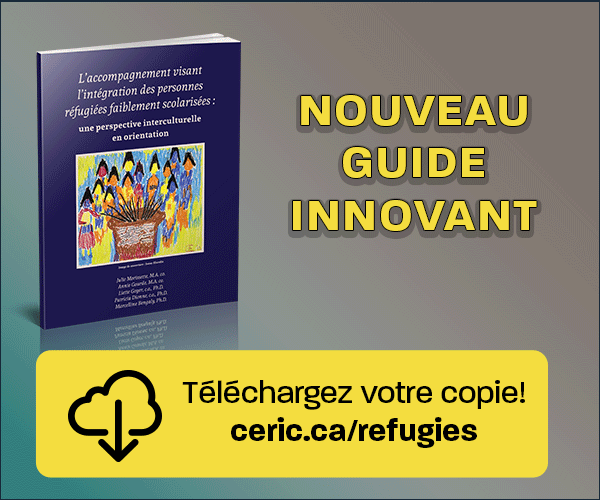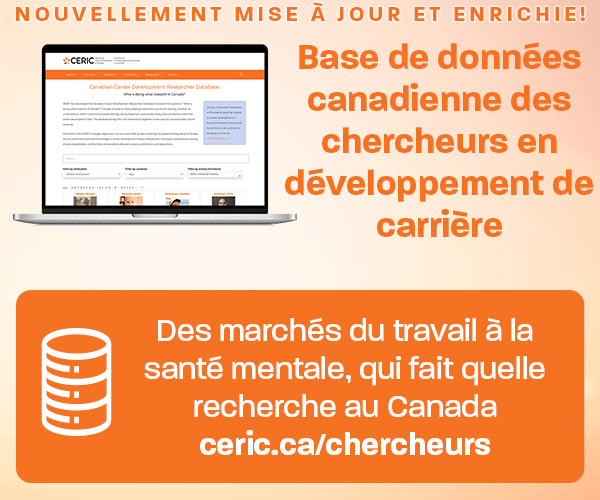Développement de carrière des mères qui travaillent : Facteurs d'aide et d'entrave à la réussite pendant la pandémie de COVID-19
DOI :
https://doi.org/10.53379/cjcd.2024.383Mots-clés :
mères qui travaillentSupprimer les mères qui travaillent, covid-19, technique améliorée de l'incident critique, recherche qualitative, développement de carrièreRésumé
L'évolution de la carrière des femmes dans le contexte de la pandémie de COVID-19 suggère que nous sommes peut-être confrontés à une "récession féminine", où les femmes courent un risque nettement plus élevé d'abandonner la vie active et où l'écart entre les hommes et les femmes sur le lieu de travail est susceptible de se creuser. La pandémie a pu offrir aux mères qui travaillent des opportunités de s'engager de manière créative dans des décisions de carrière personnelles en raison des possibilités accrues de travailler de manière flexible et de pivoter sur un marché du travail qui évolue très rapidement. Cette étude qualitative a utilisé la technique de l'incident critique amélioré pour explorer l'intersection entre les mères qui travaillent et le développement de carrière en tenant compte de la pandémie de COVID-19. Les participants à cette étude étaient un échantillon de 18 mères qui travaillent en Amérique du Nord et en Australie. Les facteurs clés qui ont été identifiés comme aidant les femmes à réussir leur développement de carrière pendant la pandémie COVID-19 sont les suivants : Des lieux de travail favorables, un soutien social, des facteurs de protection personnelle, des facteurs liés au marché de l'emploi et des ressources.
Références
Akanji, B., Mordi, C., Ajonbadi, H., & Adekoya, O. (2022). The impact of COVID-19 on the work–life balance of working mothers: evidence from Nigerian academics. Personnel Review, 52 (3), 703-723. https://doi.org/10.1108/PR-08-2020-0636
Andersson, B., & Nilsson, S. (1964). Studies in the reliability and validity of the Critical Incident Technique. Journal of Applied Psychology, 48(6), 398-403. https://doi.org/10.1037/h0042025
Ashman, R., Radcliffe, L., Patterson, A., & Gatrell, C. (2022). Re‐ordering motherhood and employment: mobilizing ‘Mums Everywhere’ during Covid‐19. British Journal of Management, 33(3), 1125-1143. https://doi.org/10.1111/1467-8551.12630
Blustein, D. L., Smith, C. M., Wu, X., Guarino, P. A., Joyner, E., Milo, L., & Bilodeau, D. C. (2022). “Like a tsunami coming in fast”: A critical qualitative study of precarity and resistance during the pandemic. Journal of Counseling Psychology, 69(5), 565-577. https://doi.org/10.1037/cou0000615
Borgen, W. A., & Amundson, N. E. (1984). The experience of unemployment. Nelson.
Butler, J. (2012). Precarious life, vulnerability, and the ethics of cohabitation. The Journal of Speculative Philosophy, 26(2), 134–151. https://doi.org/10.5325/jspecphil.26.2.0134
Butterfield, L. D., Borgen, W. A., Amundson, N. E., & Maglio, A. S. T. (2005). Fifty years of the critical incident technique: 1954-2004 and beyond. Qualitative research, 5(4), 475-497. https://doi.org/10.1177/1468794105056924
Butterfield, L. D., Maglio, A. S. T., Borgen, W. A., & Amundson, N. E. (2009). Using the enhanced critical incident technique in counselling psychology research. Canadian Journal of Counselling and Psychotherapy, 43(4), 265-282.
Canadian Standards and Guidelines for Career Development Practitioners. Glossary of Career Development Terms. 2012. http://career-dev-guidelines.org/career_dev/wp-content/uploads/2011/11/Glossary-of-Terms-changes-from-CD-Chapter-re-counselling.pdf
Catalyst (2020, Dec 8). The Detrimental Impact of Covid-19 on Gender and Racial Equality (Quick Take). https://www.catalyst.org/research/covid-effect-gender-racial-equality
Clark, S., McGrane, A., Boyle, N., Joksimovic, N., Burke, L., Rock, N., & O’Sullivan, K. (2021). “You’re a teacher you’re a mother, you’re a worker”: Gender inequality during COVID‐19 in Ireland. Gender, Work & Organization, 28(4), 1352-1362. https://doi.org/10.1111/gwao.12611
Como, R., Hambley, L., & Domene, J. (2021). An exploration of work-life wellness and remote work during and beyond COVID-19. Canadian Journal of Career Development, 20(1), 46-56.
Delaney, R. K., Locke, A., Pershing, M. L., Geist, C., Clouse, E., Debbink, M. P., ... & Fagerlin, A. (2021). Experiences of a health system’s faculty, staff, and trainees’ career development, work culture, and childcare needs during the COVID-19 pandemic. JAMA network open, 4(4). http://dx.doi.org/10.1001/jamanetworkopen.2021.3997
Dizaho, E. K., Salleh, R., & Abdullah, A. (2016). The impact of work-family conflict on working mothers’ career development: A review of literature. Australian Journal of Basic and Applied Sciences, 10(11), 328-334.
Flanagan, J. C. (1954). The critical incident technique. Psychological Bulletin, 51(4), 327–358. https://doi.org/10.1037/h0061470
Grenier, A., Phillipson, C., & Settersten, R. A. (Eds.). (2020). Precarity and ageing: Understanding insecurity and risk in later life. Policy Press.
Han, C. (2018). Precarity, precariousness, and vulnerability. Annual Review of Anthropology, 47, 331–343. https://doi.org/10.1146/annurev-anthro-102116-041644
Kalleberg, A. L. (2018). Job insecurity and well-being in rich democracies. Polity Press.
Lorey, I. (2015). State of insecurity: Government of the precarious. Verso Books.
Mäkelä, L. (2009), Representations of change within dyadic relations between leader and follower: discourses of pregnant followers. Leadership, 5(2), pp. 171-92.
McIntosh, B., McQuaid, R., Munro, A., & Dabir‐Alai, P. (2012). Motherhood and its impact on career progression. Gender in Management, 27(5), 346-364. https://doi:10.1108/17542411211252651
McKinsey & Company (2021, May 5). For mothers in the workplace, a year (and counting) like no other. https://www.mckinsey.com/featured-insights/diversity-and-inclusion/for-mothers-in-the-workplace-a-year-and-counting-like-no-other#
McQuaid, R.W., Bond, S. and Fuertes, V. (2009), Working for Families Fund Evaluation (2004-08), Scottish Government, Edinburgh. https://dera.ioe.ac.uk/1393/2/0080320.pdf
Murphy, L. D., Thomas, C. L., Cobb, H. R., & Hartman, A. E. (2021). A review of the LGBTQ+ work–family interface: What do we know and where do we go from here?. Journal of Organizational Behavior, 42(2), 139-161. https://doi.org/10.1002/job.2492
Richardson, M. S. (2012). Counseling for work and relationship. The Counseling Psychologist, 40(2), 190-242. https://doi:10.1177/0011000011406452
Standing, G. (2011). The Precariat: The new dangerous class. Bloomsbury.
Tronto, J. (2009, March). Democratic care politics in a world of limits. Keynote address to the conference of the United Nations Research Institute for Social Development, New York, NY.
Waldfogel, J. (2007). Parental work arrangements and child development. Canadian Public Policy/Analyse de Politiques, 33(2), pp. 251-72.
Wang, Y. C., Shelley Tien, H. L., & Wu, C. L. (2018). The relation of career adaptability to work–family experience and personal growth initiative among Taiwanese working parents. Journal of Employment Counseling, 55(1), 27-40. https://doi.org/10.1002/joec.12071
Warren, S., & Brewis, J. (2004). Matter over mind? Examining the experience of pregnancy. Sociology, 38(2), 219-236. https://doi.org/10.1177/0038038504040860
World Health Organization (2020). WHO director-general’s opening remarks at media briefing on covid-19 March 11. https://www.who.int/director-general/speeches/detail/who-director-general-s-opening-remarks-at-the-media-briefing-on-covid-19---11-march-2020

Téléchargements
Fichiers supplémentaires
Publié-e
Comment citer
Numéro
Rubrique
Licence
(c) Tous droits réservés La Revue canadienne de développement de carrière 2024

Cette œuvre est sous licence Creative Commons Attribution - Pas d'Utilisation Commerciale - Pas de Modification 4.0 International.











